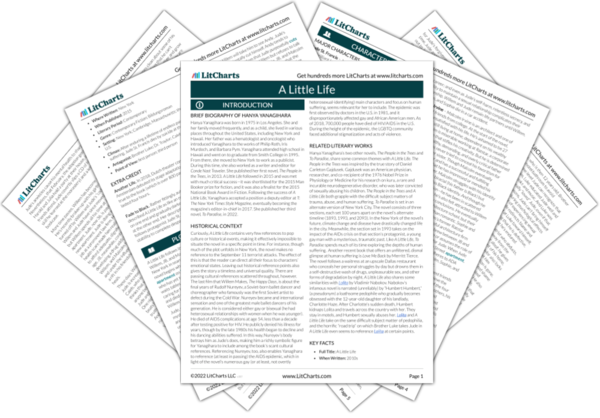Malcolm Irvine Quotes in A Little Life
But the odd thing was this: by his story morphing into one about a car accident, he was being given an opportunity for reinvention; all he had to do was claim it. But he never could. He could never call it an accident, because it wasn’t. And so was it pride or stupidity to not take the escape route he’d been offered? He didn’t know.

Unlock explanations and citation info for this and every other A Little Life quote.
Plus so much more...
Get LitCharts A+“But I’m not even in a wheelchair,” he’d said, dismayed.
“But Jude,” Malcolm had begun, and then stopped. He knew what Malcolm wanted to say: But you have been. And you will be again. But he didn’t.
“These are standard ADA guidelines,” he said instead.
“Mal,” he’d said, chagrined by how upset he was. “I understand. But I don’t want this to be some cripple’s apartment.”
He could be more like Malcolm, he thinks; he could ask his friends for help, he could be vulnerable around them. He has been before, after all; it just hasn’t been by choice. But they have always been kind to him, they have never tried to make him feel self-conscious—shouldn’t that teach him something? Maybe, for instance, he will ask Willem if he could help him with his back: if Willem is disgusted by his appearance, he’ll never say anything.
On these days, he succumbed to a sort of enchantment, a state in which his life seemed both unimprovable and, paradoxically, perfectly fixable: Of course Jude wouldn’t get worse. Of course he could be repaired. Of course Willem would be the person to repair him. Of course this was possible; of course this was probable. Days like this seemed to have no nights, and if there were no nights, there was no cutting, there was no sadness, there was nothing to dismay.
He stopped. What he wanted to say—but what he didn’t think he could get through—was what he had overheard Malcolm say as Willem was complaining about hefting the bookcase back into place and he was in the bathroom gathering the brushes and paint from beneath the sink.
“If I had left it like it was, he could’ve tripped against it and fallen, Willem,” Malcolm had whispered. “Would you want that?”
“No,” Willem had said, after a pause, sounding ashamed. “No, of course not. You’re right, Mal.”
Malcolm, he realized, had been the first among them to recognize that he was disabled; Malcolm had known this even before he did. He had always been conscious of it, but he had never made him feel self-conscious. Malcolm had sought, only, to make his life easier, and he had once resented him for this.

Malcolm Irvine Quotes in A Little Life
But the odd thing was this: by his story morphing into one about a car accident, he was being given an opportunity for reinvention; all he had to do was claim it. But he never could. He could never call it an accident, because it wasn’t. And so was it pride or stupidity to not take the escape route he’d been offered? He didn’t know.

Unlock explanations and citation info for this and every other A Little Life quote.
Plus so much more...
Get LitCharts A+“But I’m not even in a wheelchair,” he’d said, dismayed.
“But Jude,” Malcolm had begun, and then stopped. He knew what Malcolm wanted to say: But you have been. And you will be again. But he didn’t.
“These are standard ADA guidelines,” he said instead.
“Mal,” he’d said, chagrined by how upset he was. “I understand. But I don’t want this to be some cripple’s apartment.”
He could be more like Malcolm, he thinks; he could ask his friends for help, he could be vulnerable around them. He has been before, after all; it just hasn’t been by choice. But they have always been kind to him, they have never tried to make him feel self-conscious—shouldn’t that teach him something? Maybe, for instance, he will ask Willem if he could help him with his back: if Willem is disgusted by his appearance, he’ll never say anything.
On these days, he succumbed to a sort of enchantment, a state in which his life seemed both unimprovable and, paradoxically, perfectly fixable: Of course Jude wouldn’t get worse. Of course he could be repaired. Of course Willem would be the person to repair him. Of course this was possible; of course this was probable. Days like this seemed to have no nights, and if there were no nights, there was no cutting, there was no sadness, there was nothing to dismay.
He stopped. What he wanted to say—but what he didn’t think he could get through—was what he had overheard Malcolm say as Willem was complaining about hefting the bookcase back into place and he was in the bathroom gathering the brushes and paint from beneath the sink.
“If I had left it like it was, he could’ve tripped against it and fallen, Willem,” Malcolm had whispered. “Would you want that?”
“No,” Willem had said, after a pause, sounding ashamed. “No, of course not. You’re right, Mal.”
Malcolm, he realized, had been the first among them to recognize that he was disabled; Malcolm had known this even before he did. He had always been conscious of it, but he had never made him feel self-conscious. Malcolm had sought, only, to make his life easier, and he had once resented him for this.











